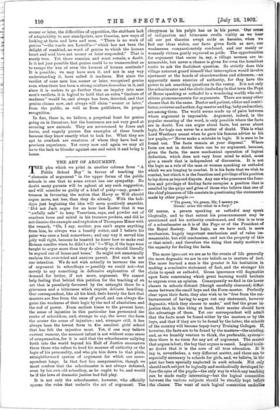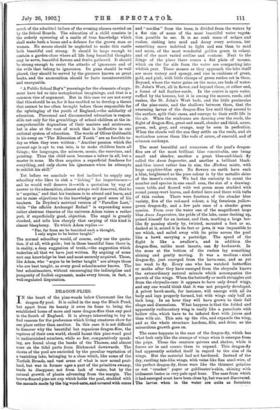THE ART OF ARGUMENT.
THE plea which we print in another column from " A Public School Boy" in favour of teaching the " elements of argument " in the upper forms of the public schools is one that to some extent has our sympathy. No doubt many parents will be aghast at any such suggestion, and will consider us guilty of a kind of petty—nay, grand— treason in favouring the notion that Harry or Will should argue more, not less, than they do already. With the holi- days just beginning the idea will seem positively anarchic. Did not Jack argue for an hour last Easter that it was " awfully safe" to keep Vesuvians, caps, and powder out of crackers loose and mixed in his trousers pockets, and did he not dismiss the example and explosion of Thompson Minor with the remark, " Oh, I say, mother, you can't argue anything from him, he always was a beastly rotter, and I believe his pater was once a beak somewhere; and any way it served him jolly well right, because he boasted he knew how to make real Roman candles when he didn't a bit" ?—Why, if the boys were taught to argue more than they do already we should literally be argued out of house and home.' So might not unnaturally exclaim the over-tried and anxious parent. But such is not our intention. We do not wish actually to increase the use of argument in schoolboys — possibly we could not—but merely to say something in defensive explanation of the demand for better, if not more, argument. We cannot help feeling that behind this petition for the teaching of an art that is peculiarly favoured by the untaught there lie a grievance and a bitterness which require delicate handling. Our correspondent, like all his kind, feels keenly the fact that masters are free from the onus of proof, and can always dis- guise the weakness of their logic by the nod of absolutism and the rod of power. From earliest times to the present hour, the sense of injustice in this particular has permeated the ranks of schooldom, and, strange to say, the lower the form the acuter the sense of injustice ; and, stranger still, it has always been the lowest form in the smallest girls' school that has felt the injustice most. Yet, if one may believe current rumour, the meanest infant is not without some sense of compensation, for it is said that the schoolmaster sallying forth into the world beyond his Hall of Justice encounters there those who refuse to heed his manner of authority or the logic of his personality, and who pin him down to that plain, straightforward system of argument for which our corre- spondent longs. In that fact lies compensation, though we must confess that the schoolmaster is not always defeated, even by his own old schoolboy, as he ought to be, and would be if the laws of dramatic justice had full play.
It is not only the schoolmaster, however, who officially spurns the rules that underlie the art of argument. The
clergyman in his pulpit has us in his power. Our settS0 of indignation and bitterness swells visibly as we heir all our pet theories swept aside as heresies, when we feel our ideas stolen, our facts given forth as new, out' weaknesses compassionately condoned, and our manly or womanly virtues gently reproved as pride. The opportunities for argument that occur in, say, a village sermon are in- numerable, but never a chance is given for even the humblest rustic to ask the foolishest question. So strictly does this village autocrat guard himself that interruption would involve ejectment at the hands of churchwardens and sidesmen,--an apparently mean exercise of authority, for they have the power to ask searching questions in the vestry. It is not only the schoolmaster and the cleric (including in that term the Pope of Rome speaking ex cathedra to a wondering world) who sub- stitute pronouncements for arguments. There are many other classes that do the same. Doctor and patient, editor and contri- butor, reviewer and author, fag-master and fag, baby and mother, are among them. The world seems made up of pairs between whom argument is impossible. Argument, indeed, in the popular meaning of the word, is only possible where the facts are in doubt. You can argue about facts, but never about logic, for logic can never be a matter of doubt. This is what Lord Westbury meant when he gave his famous advice to his law pupils,—" Never make a mistake in logic. It is sure to be found out. The facts remain at your disposal." Where facts are not in doubt there can be no argument, because, given the facts, the mere mechanical operation of logical deduction, which does not vary from mind to mind, must give a result that is independent of discussion. It is not the logic as a rale of the man or woman speaking ex cathedra, which we are longing to combat. It is his facts that we wish to combat, but which it is the function and privilege of his position to lay down as beyond dispute. Any one who possesses the func- tion and privilege of finding facts occupies a position that is assailed by the quips and gibes of those who believe that one of the chief pleasures of life consists in questioning the statements made by other people :- "'Tie green, 'tis green, Sir, I assure ye. Green! cries the other in a fury."
Of course, a person speaking ex cathedra may speak illogically, and to that extent his pronouncement may be questioned and his authority condemned, and this is as true of a schoolmaster as it is of the Pope or of the President of the Royal Society. But logic, as we have said, is mere mechanism, hugely important mechanism and of value im- measurable, but still mechanism, and not the property of this or that mind ; and therefore the thing that really matters is the capacity for finding the facts.
The more ignorant we are as to the events of life generally the more dogmatic we are in our beliefs as to matters of fact. The more learned a man is the greater is his hesitation in making a conclusive statement of fact, and the stronger hiS claim to speak ex cathedra'. Gross ignorance will dogmatise upon facts concerning which great learning would hesitate to express even an opinion. Consequently we find in the lower classes in schools distinct (though carefully obscured) differ- ences between the small boys and the Form-master. Perfectly clear upon their facts, they also wish to be "free from the em- barrassment of having to argue out any statement, however dogmatic, which they choose to make," and feel the gross in- justice that, in this thing at least, their master should have the advantage of them. Yet our correspondent will admit that the facts must be found either by the masters or by the boys, and that if they are to be found by the latter, the schools of the country will become topsy-turvy Training Colleges. It however, the facts are to be found by the masters—the existing, and, as we humbly venture to think, the preferable, systerd- then there is no room for any art of argument. The master that argues is lost; the boy that argues is caned. Logical train- no doubt that it is the core of all true education. It is ing is, nevertheless, a very different matter, and there can be especially necessary in schools for girls, and, we believe, in the past has been specially neglected in such schools. Not only should each subject be logically and methodically developed be- fore the eyes of the pupils—the only way in which any teaching can be made really interesting—but the logical connection between the various subjects should be steadily kept before the classes. The want of such logical connection underlies
much of the admitted failure of the evening classes carried on by the School Boards. The education of a child consists in the orderly uprearing of a castle of true knowledge which shall make both a home and a defence for the grown man or woman. No means should be neglected to make this castle both beautiful and strong. It should be large enough to contain a garden-close where all life long beautiful thoughts may be sown, beautiful flowers and fruits gathered. It should be strong enough to resist the attacks of ignorance and of the evils that belong to ignorance. Its guns should be well placed, they should be served by the gunners known as great books, and the ammunition should be facts incontrovertible and unarguable.
"A Public School Boy's" yearnings for the elements of argu- ment have led us into metaphorical imaginings, and that is a common vice of argument. But in this case we are not sorry that this should be so, for it has enabled us to develop a theme that cannot be too often brought before those responsible for the upbringing of the youth of England,—the solidarity of education. Piecemeal and disconnected education is respon- sible not only for the grumblings of school children at the in- comprehensible dogmatism of their masters and mistresses, but is also at the root of much that is ineffective in our national system of education. The words of Oliver Goldsmith in his essay on " The Education of Youth " are as forcible to- day as when they were written : " Another passion which the present age is apt to run into, is to make children learn all things ; the languages, the sciences, music, the exercises, and painting. Thus the child soon becomes a talker in all, but a master in none. He thus acquires a superficial fondness for everything, and only shows his ignorance when he attempts to exhibit his skill."
Yet before we conclude we feel inclined to supply any schoolboy who likes to risk a " licking" for impertinence— and he would well deserve it—with a quotation by way of answer to the admonition, almost always well deserved, that he is "arguing," and that his business is to attend and learn, and not to raise objections to the knowledge or good sense of his teachers. In Dryden's metrical version of " Paradise Lost," while " the affable Archangel Rafael " is expounding some rather abstruse theories of the universe Adam raises a rather pert, if superficially good, objection. The angel is greatly shocked, and tells him sharply that carping of this kind is almost blasphemy. To which Adam replies :— " Far, far from me be banished such a thought, I only argue to be better taught."
The normal schoolboy would, of course, only use the quota- tion, if at all, with guile ; but in these beautiful lines there is, in reality, a deep suggestion of truth,—the suggestion which underlies all that we have just written. By arguing of some sort can knowledge be beat and most securely acquired. Those, like Adam, who "argue to be better taught" are always those who are best taught, as every good schoolmaster knows. The best schoolmasters, without encouraging the indiscipline and pomposity of foolish argument, make every lesson, in fact, a well-regulated disputation.







































 Previous page
Previous page